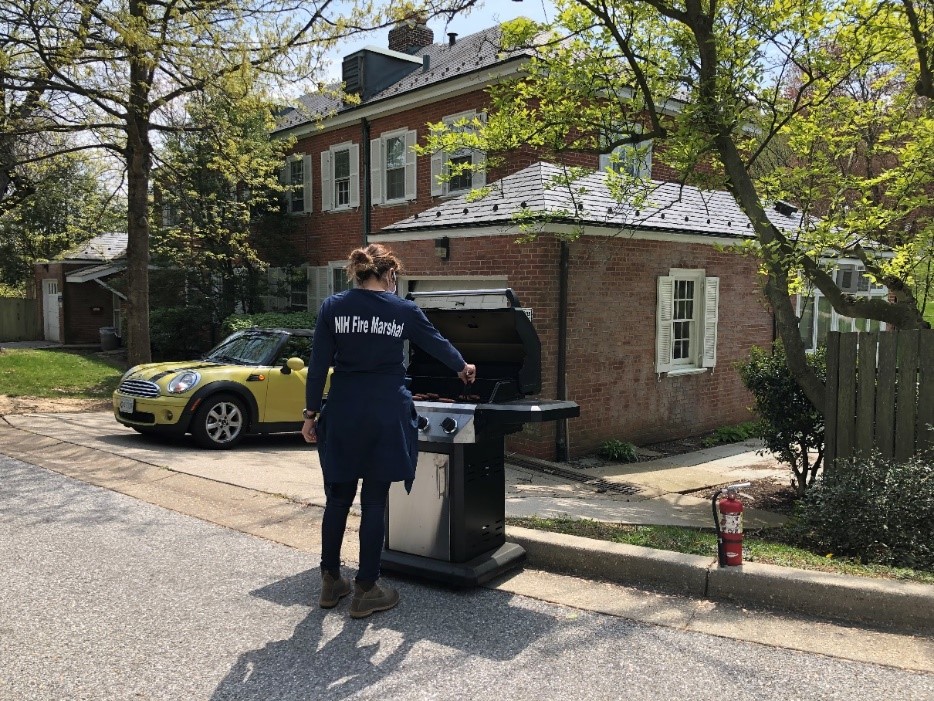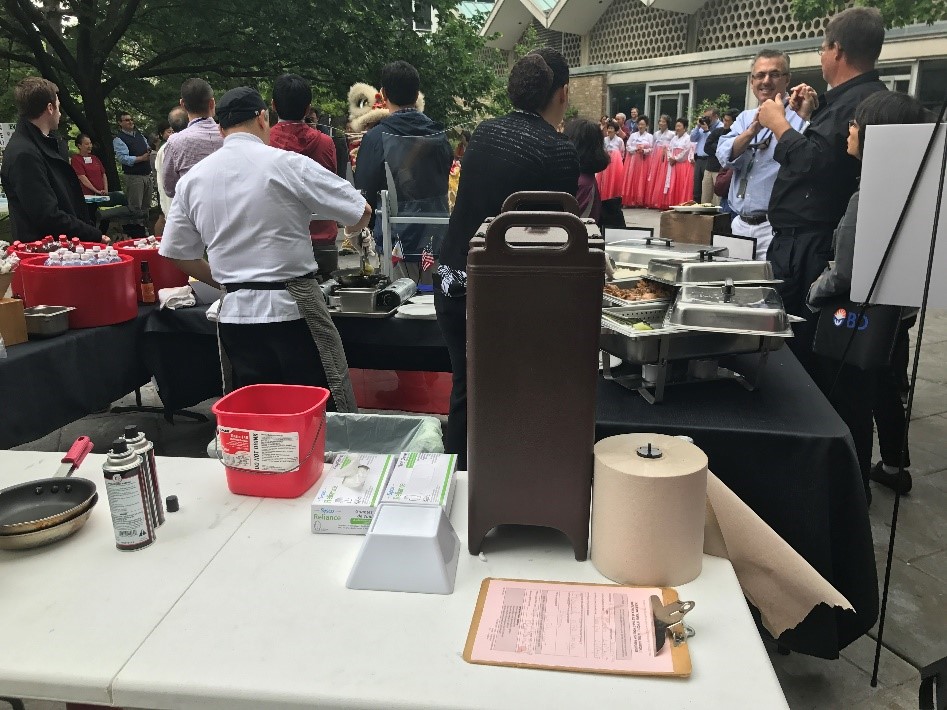(Above) A recent Montgomery County house fire that originated on a deck and involved propane tanks.
With warmer spring and summer weather approaching, and many of us spending more time than usual cooking at home due to COVID-19 precautions, the Division of the Fire Marshal, Office of Research Services, would like to share a few tips that will make using your barbecue grill a fire-safe and enjoyable experience. More than 200,000 propane gas barbecue grills are purchased each year. On most summer days there are more than four million propane gas barbecue gas grills in use in the United States. Each year an average of 19,000 injuries and 10 deaths occur as a result of gas and charcoal grill accidents. Because grills are easy to use, familiarity can lead to carelessness. Many times, grills are not inspected, maintained, used and stored in a safe and appropriate way. For examples of what can go wrong while using gas grills, see this video:
https://youtu.be/bhSa38NzYnA

(Above) A DFM employee cooking safely outside the DFM office.
Setting up New Grills
- Follow the manufacturer's instructions carefully.
- Have the store assemble it for you if you are reluctant.
Operation of All Grills
- Use the grill at least 10 feet from house walls, deck rails and eaves.
- Never use a grill on a balcony, in a garage, or under a porch or other overhang.
- Keep everyone away from the grill.
- Never move the grill once it is lit.
- Assemble everything before cooking so you can remain with the grill.
- Keep an eye on your grill while cooking; avoid distractions.
- If you have a water or ABC-rated fire extinguisher and know how to use it safely, keep it handy.
- Have a nearby garden hose connected and turned on.
- Clean your grill after each use.
Operation of Gas Grills
- Before using your propane gas barbecue grill for the first time of the season, make sure the burner ports are free of rust or dirt, and the burner gas supply throat (the tube connected to the burner) is free of dirt, dust or cobwebs.
- Leak test the fittings that run from the propane tank to the grill. Use a soapy sponge; never an open flame.
- If you discover a leak, turn off the propane cylinder valve and replace the hose, seals and fitting or have them checked and repaired by a qualified service technician.
- Open the lid before lighting.
- If the flame goes out, turn off the gas, open the lid, and wait several minutes before re-lighting.
- Store, transport, and use gas cylinders in the upright, vertical position.
- Secure gas cylinders in your vehicle so they remain in the upright position.
Operation of Charcoal Grills
- Follow manufacturer's direction on charcoal starters and charcoal starter fluid.
- Do not use gasoline or other flammable liquids as starter fluid.
- Never add charcoal starter fluid to hot charcoal.
- When you are finished grilling, let the coals completely cool before disposing of ashes in a metal container with a lid.
- For more information on proper use of charcoal grills, see this video:
https://youtu.be/YBe4wBthkvU
In case of Fire
- Call the fire department; on the Bethesda campus, dial 911 from a land line or 301-496-9911 from a cell phone.
- Fight the fire only if the fire is small enough, you are trained, and it is safe to do so.
- Keep everyone away.
- Provide information to firefighters when they arrive.
Procedures for Use and Operation of a Grill at NIH facilities

(Above) A DFM temporary cooking permit on display in the foreground at an NIH event.
- Prior to using a barbecue grill or conducting temporary/mobile cooking on the NIH campus, please see Administrative Interpretation 20-2 on the DFM website:
https://www.ors.od.nih.gov/ser/dfm/Pages/Administrative-Interpretations.aspx
- Obtain a Mobile and Temporary Cooking Permit by contacting the Division of the Fire Marshal at 301-496-0414.
- The Fire Inspector will explain proper barbecue grill use and answer any questions when visiting the site for the inspection and issuance of the required permit.
If you have any questions regarding fire-safety issues for barbecue grills, please contact the NIH Fire Marshal at 301-496-0487.
